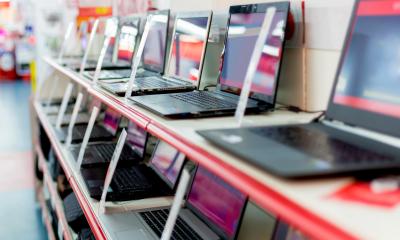
Whatever your sole trader, freelance or small business does, you will need some sort of IT or computer system to operate efficiently. Whether your requirements are as simple as being able to invoice customers and take payments or more complex word processing, customer data storage, email marketing or design and coding there will be a solution for you. The trick is identifying what you want to do with your business computer before looking at specific makes and models.
Do you need a computer system?
These days, the smartphone in your pocket can do many of the tasks that we used to rely on a desktop or laptop computer for. There are mobile versions of most of the software you might need in your business, from accounting software to customer relationship management software. Microsoft 365 and Google Workspace also bring together all the familiar desktop tools and allow you to access the apps you need from your phone. This functionality might mean that a smartphone combined with the relevant apps might be sufficient for your needs - especially if you are only doing ad hoc computer tasks.
Computer system options
The most common type of business computer is a PC (personal computer). PCs are made by different companies but all use the same underlying technology. They usually run Microsoft Windows and are the type of computer most people are familiar with.
The main alternative is an Apple Mac. Macs are usually more expensive than comparable PCs and have traditionally been used in creative industries.
Macs can be popular with employees and some companies use a mix of PCs and Macs, depending on staff preferences and roles.
Business computer systems are available as:
- Desktops, consisting of a base unit, monitor, keyboard and mouse. They are designed to be set up and used in one place.
- 'All-in-ones', as above, but with the monitor also housing the computer itself (Apple iMacs are the most common example). Again, designed to be set up and used in one place.
- Laptops, portable computers that can be used on the move.
Desktop computer systems are sometimes cheaper than a laptop of equivalent specification, but laptops offer the added benefit of portability, a key consideration in an increasingly flexible and mobile workplace.
There is, arguably, a third type of business computer system to consider. Tablet computers are touch screen devices you can slip into your bag and take anywhere, and they're a compelling replacement for traditional business computers.
Because they're so small and light, tablets are very versatile. They offer slim keyboard cases and are capable of running business software that was once consigned to the desktop PC. Tablets are a great way to embrace mobile working.
If you're considering a tablet computer, take a look at the Apple iPad Pro or Microsoft Surface.
Key features of a business computer system
The business computer market is cut-throat, which keeps prices generally low.
You can also be fairly confident that your new computer will be up to running typical business software.
It's wise to pay attention to these key features when choosing a business computer system:
Processor
Also called the central processing unit (CPU), this is the computer chip that does all the hard work.
Two main factors determine a CPU's performance: the number of cores and the speed at which it runs. The speed is measured in gigahertz (GHz).
As a minimum look for a quad core processor running at a minimum of 2.5GHz.
Memory
Random access memory (RAM) is where a business computer stores data it uses frequently.
RAM is measured in gigabytes (GB). For general business tasks such as word processing and internet usage 16GB is the minimum you'll need,although it's worth noting at devices that are mostly accessing software or data in the cloud will require less RAM.
Hard drive
The hard drive (HD or HDD) is used for longer-term storage of files. HD capacity is also measured in GB.
Most companies encourage employees to save their work centrally, either onto a network server or cloud storage.
This means that your individual business computer systems probably don't need massive hard drives. A good minimum is 250GB, although many systems will come with more as standard.
Some higher-end laptops now use a solid state drive (SSD) instead of a hard drive. SSDs are faster and more reliable, because they have no moving parts.
If you have the choice, it is usually better to opt for a smaller SSD over a large HD.
Monitor
Desktop computers usually come with a flat screen monitor. For laptops, it's a good idea to buy separate external monitors for use in the office.
Cheap monitors are adequate, but basic. Spending a little more on larger screens can make employees more productive.
Look for a minimum 21-inch screen with a 'full HD' screen. Learn more about screen size and resolution.
Brightness, sharpness and colour representation can vary between different monitors. The best way to choose a screen is to sit down in front of it and see if you like it.
Watch out for screens with a shiny coating. They can sometimes cause troublesome reflections. Touch screens are also becoming more common as operating systems embrace touch as an input method.
Also consider ergonomics and comfort when choosing monitors. Buying movable arms to mount your monitors helps employees achieve a comfortable working position.
Although these are the main things to watch for, other seemingly minor factors can also be important because they can affect how usable your business computer systems.
Computer accessories
When purchasing computer systems, remember to budget for the the accessories you may need.
In addition to monitors (see above), you may require a keyboard and mouse for each employee. Opting for cheap items can be a false economy. These are the tools employees use to interact with their computers, and so it's important they are comfortable and durable.
Make sure your computer accessories meet relevant health and safety rules. There may also be other accessories that would be beneficial.
What will a business computer cost?
Basic PCs start at around £500, but may need replacing sooner. You shold also factor in the costs of your accessories. Mid-range PCs are best for general business tasks like word processing and accessing the internet. They cost around £1,000 and should last about three years. An all-in-one PC might cost upwards of £600.
High-end PCs with fast processors are likely to cost in excess of £1,200. They can handle intensive tasks like video editing and large databases. These office computers may also be better able to handle system upgrades.
These prices are for desktop computers. Expect to pay a little more for a standard laptop, or significantly more for an ultra-thin model.
If you opt for an Apple device, iMac desktop computers start from around £1,400, while MacBook laptops start from around £1,000.


